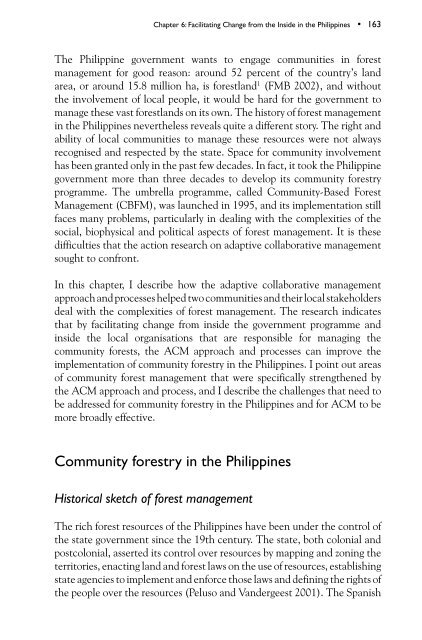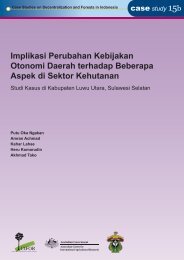Adaptive collaborative management of community forests in Asia ...
Adaptive collaborative management of community forests in Asia ...
Adaptive collaborative management of community forests in Asia ...
You also want an ePaper? Increase the reach of your titles
YUMPU automatically turns print PDFs into web optimized ePapers that Google loves.
Chapter 6: Facilitat<strong>in</strong>g Change from the Inside <strong>in</strong> the Philipp<strong>in</strong>es • 163<br />
The Philipp<strong>in</strong>e government wants to engage communities <strong>in</strong> forest<br />
<strong>management</strong> for good reason: around 52 percent <strong>of</strong> the country’s land<br />
area, or around 15.8 million ha, is forestland 1 (FMB 2002), and without<br />
the <strong>in</strong>volvement <strong>of</strong> local people, it would be hard for the government to<br />
manage these vast forestlands on its own. The history <strong>of</strong> forest <strong>management</strong><br />
<strong>in</strong> the Philipp<strong>in</strong>es nevertheless reveals quite a different story. The right and<br />
ability <strong>of</strong> local communities to manage these resources were not always<br />
recognised and respected by the state. Space for <strong>community</strong> <strong>in</strong>volvement<br />
has been granted only <strong>in</strong> the past few decades. In fact, it took the Philipp<strong>in</strong>e<br />
government more than three decades to develop its <strong>community</strong> forestry<br />
programme. The umbrella programme, called Community-Based Forest<br />
Management (CBFM), was launched <strong>in</strong> 1995, and its implementation still<br />
faces many problems, particularly <strong>in</strong> deal<strong>in</strong>g with the complexities <strong>of</strong> the<br />
social, biophysical and political aspects <strong>of</strong> forest <strong>management</strong>. It is these<br />
difficulties that the action research on adaptive <strong>collaborative</strong> <strong>management</strong><br />
sought to confront.<br />
In this chapter, I describe how the adaptive <strong>collaborative</strong> <strong>management</strong><br />
approach and processes helped two communities and their local stakeholders<br />
deal with the complexities <strong>of</strong> forest <strong>management</strong>. The research <strong>in</strong>dicates<br />
that by facilitat<strong>in</strong>g change from <strong>in</strong>side the government programme and<br />
<strong>in</strong>side the local organisations that are responsible for manag<strong>in</strong>g the<br />
<strong>community</strong> <strong>forests</strong>, the ACM approach and processes can improve the<br />
implementation <strong>of</strong> <strong>community</strong> forestry <strong>in</strong> the Philipp<strong>in</strong>es. I po<strong>in</strong>t out areas<br />
<strong>of</strong> <strong>community</strong> forest <strong>management</strong> that were specifically strengthened by<br />
the ACM approach and process, and I describe the challenges that need to<br />
be addressed for <strong>community</strong> forestry <strong>in</strong> the Philipp<strong>in</strong>es and for ACM to be<br />
more broadly effective.<br />
Community forestry <strong>in</strong> the Philipp<strong>in</strong>es<br />
Historical sketch <strong>of</strong> forest <strong>management</strong><br />
The rich forest resources <strong>of</strong> the Philipp<strong>in</strong>es have been under the control <strong>of</strong><br />
the state government s<strong>in</strong>ce the 19th century. The state, both colonial and<br />
postcolonial, asserted its control over resources by mapp<strong>in</strong>g and zon<strong>in</strong>g the<br />
territories, enact<strong>in</strong>g land and forest laws on the use <strong>of</strong> resources, establish<strong>in</strong>g<br />
state agencies to implement and enforce those laws and def<strong>in</strong><strong>in</strong>g the rights <strong>of</strong><br />
the people over the resources (Peluso and Vandergeest 2001). The Spanish
















